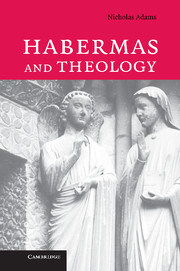Book contents
- Frontmatter
- Contents
- Preface
- 1 Religion in public
- 2 The ideal speech situation
- 3 Authority and distance in tradition
- 4 Sacred and profane
- 5 Universalism
- 6 Theology and political theory
- 7 Theology, social theory and rationalisation
- 8 Modernity's triumph over theology
- 9 Habermas in dialogue with theologians
- 10 Narrative and argument
- 11 Scriptural difference and scriptural reasoning
- List of references
- Index
1 - Religion in public
Published online by Cambridge University Press: 23 December 2009
- Frontmatter
- Contents
- Preface
- 1 Religion in public
- 2 The ideal speech situation
- 3 Authority and distance in tradition
- 4 Sacred and profane
- 5 Universalism
- 6 Theology and political theory
- 7 Theology, social theory and rationalisation
- 8 Modernity's triumph over theology
- 9 Habermas in dialogue with theologians
- 10 Narrative and argument
- 11 Scriptural difference and scriptural reasoning
- List of references
- Index
Summary
How can there be argument between members of different traditions? This is arguably the most important question in contemporary moral philosophy and theology. To be a modern person is to participate in a public sphere characterised by rival voices, dissonant worldviews and forms of life that are baffling to each other. How are they to be coordinated? Many moral questions are bound up with religious affiliation. The major traditions have different narratives rehearsing God's care for the vulnerable: the young, the old, the abandoned, the poor, the imprisoned, the enslaved, the sick, the disabled. How do these narratives inform and hinder public argumentation? This study engages with Jürgen Habermas' views on religion and theology in the context of his understanding of the modern public sphere. Habermas is an unusual atheistic and secular philosopher: he makes positive claims about religion in modern society at the same time as insisting that moral theory must be post-religious or post-traditional. He has developed a well-known theory of communicative action and a discourse ethics whose purpose is to address the question of argumentation in the public sphere. His work over fifty years can be viewed as an attempt to articulate the unity that makes it possible to hear cultural differences as a diversity of voices rather than merely as a mass of dissociated utterances that are unintelligible to each other.
Religion plays a curious role in this theory. Habermas both values it and distances himself from it.
- Type
- Chapter
- Information
- Habermas and Theology , pp. 1 - 22Publisher: Cambridge University PressPrint publication year: 2006

